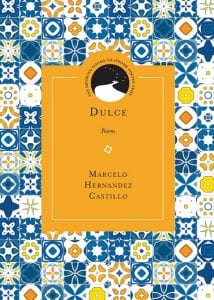2020: Darrel Alejandro Holnes, Migrant Psalms
Migrant Psalms pulls together prayer, popular culture, and technology to tell a twenty-first century migrant narrative. Migrant Psalms gives us a rare look inside a Panamanian experience of migration, describing the harsh realities of mothers, children, and teens who entered the United States—or tried to do so. Holnes’s poems find the universal through their specificity; their exploration of expatriation, assimilation, and naturalization transcend the author’s personal experiences to speak to what it means to be “other” in any nation today.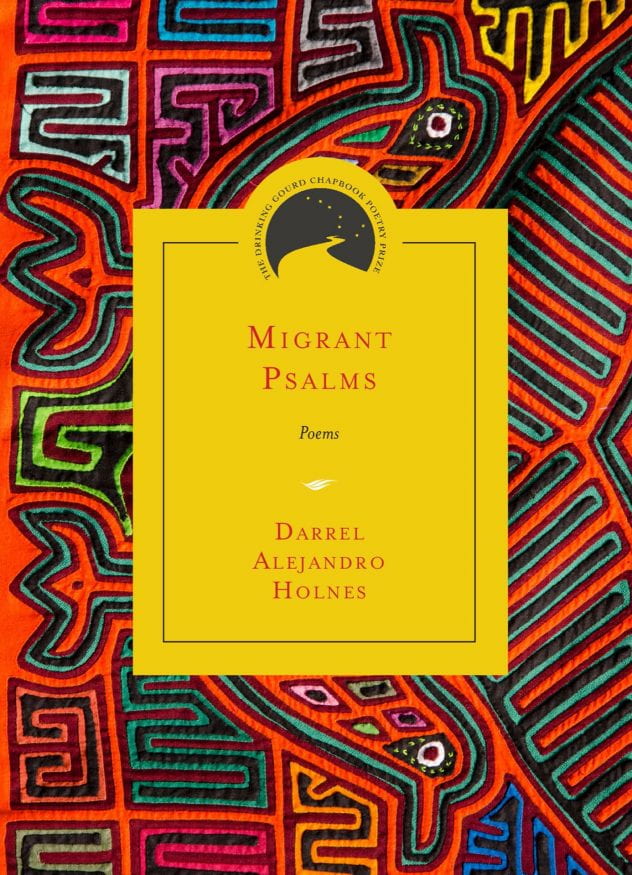
The collection begins with “Kyrie,” a coming-to-America chronicle that spans three years in Texas, modeled after the liturgical Christian prayer of the same name. Other poems experiment with macaronic language and form to parallel shifts in the speaker’s status from immigrant to citizen, ending with “The 21st Century Poem,” which probes what’s “real” in today’s New York City. Through the speaker’s quest to become an American, this collection asks, who are we becoming as individuals, as a society, as a nation, as a world? And is belief enough to enact change? Or is it just the first step?
Darrel Alejandro Holnes is the recipient of a National Endowment for the Arts Creative Writing Fellowship in Poetry. His poems have previously appeared in the American Poetry Review, Poetry Magazine, Callaloo, Best American Experimental Writing 2014, and elsewhere in print and online. Holnes is a Cave Canem and CantoMundo fellow. He has also earned scholarships to the Bread Loaf Writers’ Conference, Fine Arts Work Center in Provincetown, Postgraduate Writers Conference at Vermont College of Fine Arts, and residencies nationwide including a residency at the MacDowell Arts Colony. His poem, “Praise Song for My Mutilated World,” won the C.P. Cavafy Poetry Prize from Poetry International. He is currently an Assistant Professor of Creative Writing and Playwriting at Medgar Evers College, a City University of New York, and he teaches at New York University.
2019: Ama Codjoe, Blood of the Air

Blood of the Air creates a new mythology, repurposing spectacle, stereotype, and song. Inspired by the fictions and frictions of the past, each poem in this collection complicates the next. Lush lyrical moments give way to fracture, vulnerability, and reinvention. The title poem—one of several found poems—calls attention to stories told in the wake of sexual violence. In “She Said,” the collection’s longest piece, language culled from the transcript of a 17th century rape trial feels eerily familiar. Formally dexterous and refreshingly bold, the poems in Blood of the Air are urgent, moving, and fiercely imagined. Though blood can flow from the site of a wound, Codjoe seems to say, blood is also a sign of life.
AMA CODJOE has been awarded support from the Cave Canem, Saltonstall, Jerome, and Robert Rauschenberg Foundations as well as from the Callaloo Creative Writing Workshop, Crosstown Arts, Hedgebrook, and the MacDowell Colony. Her recent poems have appeared in The Common, Massachusetts Review, Southern Indiana Review, and elsewhere. Codjoe is the recipient of a 2017 Rona Jaffe Writer’s Award, the Georgia Review’s 2018 Loraine Williams Poetry Prize, a 2019 DISQUIET Literary Prize, and a 2019 NEA Creative Writing Fellowship.
2018: Andrew E. Colarusso & Thiahera Nurse, Creance; Or, Comest Thou Cosmic Nazarite and Some Girls Survive on Their Sorcery Alone
The Poetry and Poetics Colloquium, in conjunction with Northwestern University Press, is delighted to announce that Thiahera Nurse & Andrew E. Colarusso are the winners of the seventh annual Drinking Gourd Chapbook Poetry Prize. Their manuscripts, Some Girls Survive on Their Sorcery Alone and Creance; Or, Comest Thou Cosmic Nazarite will be published by Northwestern University Press in Fall 2018 with a planned launch party at the Poetry Foundation in Chicago, IL in January 2019.
The Drinking Gourd Prize is a first book award for poets of color. Showcasing the work of emerging poets of color, volumes in the Drinking Gourd series are selected by a panel of distinguished minority poets and scholars and feature a short introduction by a senior minority writer. This is an annual award combining the efforts of Northwestern’s Poetry and Poetics Colloquium and Northwestern University Press in celebrating and publishing works of lasting cultural value and literary excellence.

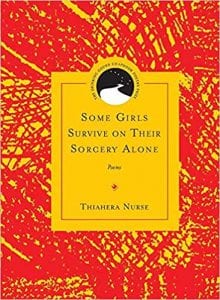
Andrew E. Colarusso was born and raised in Brooklyn, NY. He is currently an assistant professor of literary arts at Brown University. He is the founder and editor-in-chief of The Broome Street Review, an independently published literary journal dedicated to art and culture at the vanguard. His debut novel, The Sovereign, is available from Dalkey Archive Press and his writing has been published or is forthcoming in Callaloo, Callaloo Art, FENCE, and 3:AM Magazine, among others.
Thiahera Nurse is from Hollis, Queens by way of Trinidad and Tobago. She received her MFA in Poetry at the University of Wisconsin-Madison. Her work can be found in The Rumpus, Callaloo, The Offing, and in the forthcoming edition of The BreakBeat Poets Anthology. She has received support from Callaloo, Tin House, and The Pink Door Retreat. She is a 2018 Poets House Emerging Poets Fellow. She writes for the black girls (the living and the dead). She is an expert in thinking aloud.
2017: Marcelo Hernandez Castillo, Dulce
Surreal and deeply imagistic, the poems in Dulce map a parallel between the landscape of the border and the landscape of sexuality. Castillo invites the reader to confront and challenge the distinctions of borders and categories, and in doing so, he obscures and negates such divisions: between citizen/non citizen, queer/straight, man/woman. His poems — at once confession and elegy — open the possibility of an and in a world of either/or. The volume as a whole enacts a prescient anxiety about what is to come: “I want to say all of this is true / but we both know it isn’t…we already know what’s at the other end of this.” Dulce is truly a lyrical force rife with the rich language of longing and regret that disturbs even the most serene quiet.
Marcelo Hernandez Castillo was born in Zacatecas, Mexico, and crossed the border through Tijuana at the age of five with his family. He is a Canto Mundo fellow and the first undocumented student to graduate from the University of Michigan’s MFA program. He teaches at Sacramento State University as well as at The Atlantic Center for the Arts in Florida. He was a finalist for the New England Review Emerging Writer Award and his manuscript, Origin of Drowning, was a finalist for the Alice James Book Prize and the National Poetry Series. His work has been adapted into opera through collaboration with the composer Reinaldo Moya. His poems and essays can be found in Indiana Review, New England Review, Southern Humanities Review, Gulf Coast, PBS News Hour, Fusion TV, and Buzzfeed, among others. He cofounded the Undocupoets campaign which successfully eliminated citizenship requirements from all major first poetry book prizes in the country and was recognized with the Barnes and Noble “Writers for Writers” award from Poets and Writers Magazine.
2016: Mayda Del Valle, The University of Hip-Hop
 of Chicago, more specifically a particular moment in Chicago—of growth and development, coming of age, of learning how to construct a new self from old-world customs and new-school traditions. It is a meditation on movement and migration that asks what it means to leave home, how to take home with you, and how to build a new home elsewhere. These poems invoke nostalgia tempered with the knowledge that one cannot return to the past. They employ tonal and structural variations that account for said nostalgia without risking naïveté, taking all the influence of that time (hope, youth, love, music, art, and engagement) as a formal device, yet one filtered through the condensation of a current, more mature and nuanced understanding. The worldview learned then is employed in the now and frames the approach to the work, moving through formal registers that include spoken word, American lyric and narrative traditions, experimental thrusts, and documentary honed with the edge of hip-hop.
of Chicago, more specifically a particular moment in Chicago—of growth and development, coming of age, of learning how to construct a new self from old-world customs and new-school traditions. It is a meditation on movement and migration that asks what it means to leave home, how to take home with you, and how to build a new home elsewhere. These poems invoke nostalgia tempered with the knowledge that one cannot return to the past. They employ tonal and structural variations that account for said nostalgia without risking naïveté, taking all the influence of that time (hope, youth, love, music, art, and engagement) as a formal device, yet one filtered through the condensation of a current, more mature and nuanced understanding. The worldview learned then is employed in the now and frames the approach to the work, moving through formal registers that include spoken word, American lyric and narrative traditions, experimental thrusts, and documentary honed with the edge of hip-hop.2016: Jenny Xie, Nowhere to Arrive
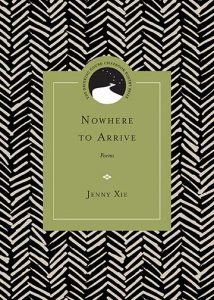 Nowhere to Arrive takes as its subjects the whiplash of travel, the shuttling between disparate places and climes, and an unremitting sense of dislocation. These poems court the tension between the familiar and the foreign, between the self as distinct and the self as illusory. They look plainly at the startling strangeness of varied landscapes and mindscapes, and interrogate a state of unrootedness—one thrown into relief by the speaker’s years abroad in Southeast Asia. At the chapbook’s center are two long poems, titled “Phnom Penh Diptych: Wet Season” and “Phnom Penh Diptych: Dry Season,” that examine the escapist narratives that draw tourists and expatriates to Cambodia, and the speaker’s own privileged positioning. On a formal level, the poems in Nowhere to Arrive make room for the unsaid and that which cannot be articulated. Here, we have a vocabulary of silence alongside stark imagistic juxtapositions, poems that celebrate compression and the force of paratactic constructions. Attentiveness and concentration emerge as virtues, as the speaker surveys the vast territory of the present with a wakeful gaze.
Nowhere to Arrive takes as its subjects the whiplash of travel, the shuttling between disparate places and climes, and an unremitting sense of dislocation. These poems court the tension between the familiar and the foreign, between the self as distinct and the self as illusory. They look plainly at the startling strangeness of varied landscapes and mindscapes, and interrogate a state of unrootedness—one thrown into relief by the speaker’s years abroad in Southeast Asia. At the chapbook’s center are two long poems, titled “Phnom Penh Diptych: Wet Season” and “Phnom Penh Diptych: Dry Season,” that examine the escapist narratives that draw tourists and expatriates to Cambodia, and the speaker’s own privileged positioning. On a formal level, the poems in Nowhere to Arrive make room for the unsaid and that which cannot be articulated. Here, we have a vocabulary of silence alongside stark imagistic juxtapositions, poems that celebrate compression and the force of paratactic constructions. Attentiveness and concentration emerge as virtues, as the speaker surveys the vast territory of the present with a wakeful gaze.Jenny Xie teaches writing at NYU. Her work appears in Tin House, The Los Angeles Review of Books, The Literary Review, Oxford Poetry, Gulf Coast, and elsewhere. She resides in Brooklyn.
2015: Nicole Sealey, The Animal After Whom Other Animals Are Named

At turns humorous and heartbreaking, The Animal After Whom Other Animals Are Named explores in both formal and free verse what it means to die, which is to say, also, what it means to live. In this collection, Sealey displays an exquisite sense of the lyric, as well as an acute political awareness. Never heavy-handed or dogmatic, the poems included in this slim volume excavate the shadows of both personal and collective memory and are, at all points, relentless. To quote the poet herself, here is a debut as luminous and unforgiving “as the unsparing light at tunnel’s end.”
2014: Willie Lin, Instructions for Folding
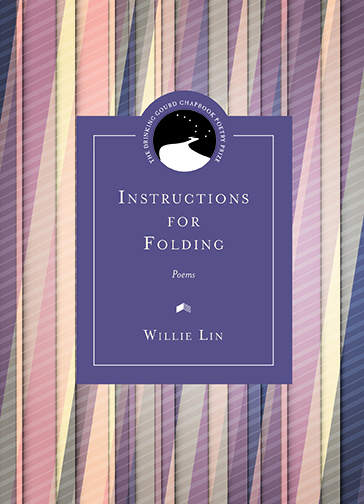 In one of the poems in Instructions for Folding, Willie Lin writes, “it seemed you were away but not beyond language.” And accordingly, the voice in these poems is sometimes fervid, sometimes wry, moved to speech by the specific desire to speak to someone. The poems often progress associatively, following a kind of lyric logic of involution, disruption, and juxtaposition. They rehearse the work of learning the heft and shape of memories. They revel in failures and take pleasure in mourning. They bristle with narrative suggestiveness, weaving an austere music against a scrim of love, loneliness, secrets, and elation. Instructions for Folding is unflinching in accounting for the daily cruelties of our lives, the melancholy of it. The poems ask us to succumb to the grace of the fold, the redemption of paper, the mapping and charting of ink and joy.
In one of the poems in Instructions for Folding, Willie Lin writes, “it seemed you were away but not beyond language.” And accordingly, the voice in these poems is sometimes fervid, sometimes wry, moved to speech by the specific desire to speak to someone. The poems often progress associatively, following a kind of lyric logic of involution, disruption, and juxtaposition. They rehearse the work of learning the heft and shape of memories. They revel in failures and take pleasure in mourning. They bristle with narrative suggestiveness, weaving an austere music against a scrim of love, loneliness, secrets, and elation. Instructions for Folding is unflinching in accounting for the daily cruelties of our lives, the melancholy of it. The poems ask us to succumb to the grace of the fold, the redemption of paper, the mapping and charting of ink and joy.
2013: Rodney Gomez, Mouth Full of Night
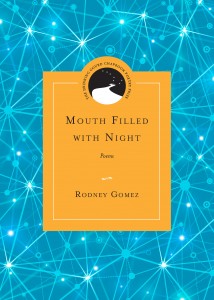 The winner of the Drinking Gourd Chapbook Poetry Prize, Rodney Gomez’s collection Mouth Filled with Night employs familiar emblems of Mexican American identity to repeatedly subvert expectations while intensifying the dilemmas of affiliation. The poems run beyond more conventional ideas of agency, identity, and experience, creating a newly invigorated imaginative space. As a collection, Mouth Filled with Night gains particular momentum–a pitched anxiety that slowly grows throughout the volume–to create a poetic experience unique to the chapbook form.
The winner of the Drinking Gourd Chapbook Poetry Prize, Rodney Gomez’s collection Mouth Filled with Night employs familiar emblems of Mexican American identity to repeatedly subvert expectations while intensifying the dilemmas of affiliation. The poems run beyond more conventional ideas of agency, identity, and experience, creating a newly invigorated imaginative space. As a collection, Mouth Filled with Night gains particular momentum–a pitched anxiety that slowly grows throughout the volume–to create a poetic experience unique to the chapbook form.

2012: Kristiana Rae Colón, promised instruments
Taking its cue from Toni Morrison’s declaration that “language alone protects us from the scariness of things with no names,” Kristiana Rae Colón’s promised instruments stitches its own definitions for what is granted, what is surrendered, what is pilfered, and what is reclaimed. Her poems plumb the problem of women’s mental health, their sexuality and gender identity, and their ability to make choices about sexual activity. With piercing musicality and disarming vulnerability, promised instruments invites its readers to interrogate their own complicity in these issues and to share in the healing process.
Kristiana Rae Colón is a poet, playwright, actor, and educator living in Chicago. She has been featured on the HBO television series Def Poetry Jam and on WBEZ’s Chicago Public Media. Her work has been nominated for a Pushcart Prize honoring the best writing published in small presses, and it has been anthologized in Not a Muse (2009), Best of the Web 2010, and the upcoming collection Chorus: A Literary (Re) Mixtape, an anthology of poetry by young people edited by Saul Williams and Dufflyn Lammers.
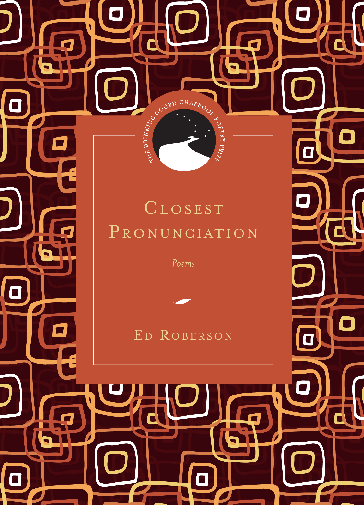
2012: Ed Roberson, Closest Pronunciation
Northwestern University Press is honored to publish Ed Roberson’s Closest Pronunciation. Here is a teacher of poets studying his own assignments, questioning and seeking the generative capacity in looking at and seeing things that ends in the realization of a poem. In a line from the brief poem “Night Writing,” from which the chapbook draws its title, he writes, “The word closest in pronunciation / To an ambulance’s siren is ‘wrong.’ ” The collection as a whole gives voice, often quiet but always profound, to many things overlooked and neglected in culture, nature, and everyday life.
Ed Roberson is the author of nine books of poetry, most recently To See the Earth Before the End of the World (2010), which was a finalist for the 2010 Los Angeles Times Book Prize and one of two runners-up for the 2011 Kingsley and Kate Tufts Poetry Award. His other honors include the 2008 Shelley Memorial Award from the Poetry Society of America and the 2011 Stephen Henderson Critics Award for Achievement in Literature. He is currently the Distinguished Artist in Residence at Northwestern University, where he teaches in the Creative Writing Program.


